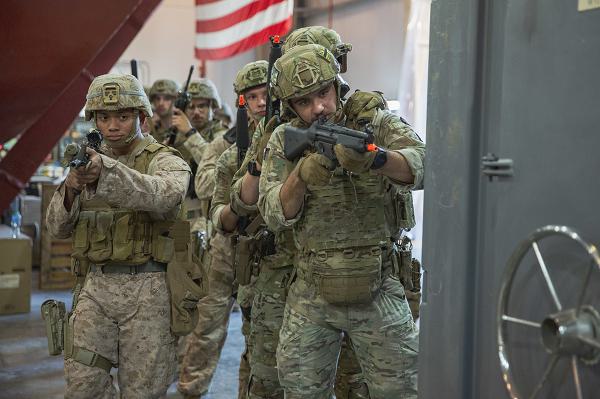
Naval Support Activity, Bahrain. (April 6, 2024): The Navy has commandos, other than the SEALs, who are both FAST… and deadly. In this photo by Staff Sergeant Victor A. Mancilla, Marines with Fleet Anti-terrorism Security Team (FAST) join Royal Marines with 42 Commando to practice visit, board, search, and seizure tactics at sea. The Navy recently dispatched a FAST unit to Haiti to protect the embassy and U.S. personnel as the situation there deteriorates.
FAST units provide expeditionary anti-terrorism and security forces to embassies, consulates, and other vital national assets that are so sensitive they require an armed force for protection. Their British counterparts, the 42 Commando, is also an extreme readiness commando force with specific expertise in maritime operations. They work in small teams to build the capacity of allies to guard their territorial waters. They establish Ships Force Protection Teams and train indigenous forces to conduct maritime interdiction and boarding operations.
Beginning in the 1970s, the world saw the rise of modern terrorism and attacks against American interests overseas. The Navy realized it did not have a quick reaction security force to respond to terrorist threats at embassies around the world. The result was the FAST concept of positioning commando units at various central locations around the globe ready to respond, instantly, to threats to embassy or U.S. interests anywhere in the world.
Obviously, not everyone can join high speed units like these.
To become a member, Security Force Marines must volunteer to join and, if accepted, must pass a grueling five weeks of FAST training. From there they go through an eight-week Close Quarter Battle (CQB) School that teaches FAST Marines how to fight hand-to-hand while clearing rooms, hallways, stairways, as well as dynamic entry associated with urban combat.
Following CQB school, FAST Marines take a tactical driving course to learn motorcade operations, evasive driving, PIT maneuvers, ramming, and driver down drills. They also train to become bodyguards by studying personal security tactics for high-risk personnel. Next comes training in individual non-lethal weapons and how to disarm or immobilize an assailant. Finally, they attend the Helicopter and Rope Suspension Techniques Master Course where they learn how to fast rappel down buildings and out of helicopters.
The FAST unit currently on their way to crisis-torn Haiti is prepared to evacuate non-emergency personnel from Port-au-Prince if needed.


